Frequently Asked Questions
Women Supporting Women
About WAGEC
Learn more about our organisation.Who is WAGEC?
Women’s and Girls’ Emergency Centre (WAGEC) exists to create safe futures for women and families. We work across the lands of the Gadigal and Wangal people of the Eora Nation (Inner City/Inner West Sydney).
We provide housing and support in times of crisis, creating safety for women and children impacted by homelessness, domestic violence and social disadvantage. We build on the existing strength and resilience of our clients through the provision of therapeutic and practical support, financial independence through training and education opportunities and targeted services for children and young people to break the cycle of violence, intergenerational trauma and social disadvantage. We actively engage our communities and supporters to be a part of the prevention movement to end gender based violence in a generation.
We are a grassroots organisation, actively working within our community to advocate for social change.
What is WAGEC's herstory?
WAGEC is a product of feminist movements and social reforms of the 1970’s in Sydney where women organised together to create awareness and politicise women’s inequality. These women made clear the links between structural inequality and injustice and listened to the experiences of women and children who had been affected by domestic and family violence, by sexual violence and by structural disadvantage. Most of all, these women demanded social change. In 1974 the first women’s refuge was established in Glebe, just up the street from WAGEC’s current head office in Redfern, by a group of Women’s Liberation activists. After months of unsuccessful applications to the government and private developers, the women smashed the windows of vacant homes in Glebe and began operating them as safe spaces for women and children. Like these women, WAGEC has always had to adapt to survive, reimagine our feminist values in a patriarchal system and continue to advocate to have our voices and stories heard.
WAGEC was established in 1977 by a woman named Jeannie Devine. A woman who after becoming homeless and navigating the system (only to experience its failures), took it upon herself to create a space where women could go after everyone else had turned them away, a home for those who had fallen through the cracks. More than 40 years later, WAGEC has grown from a small drop-in service in Surry Hills: WAGEC now operates three crisis refuges and 40 transitional properties for women and families escaping domestic and family violence and/or homelessness. WAGEC continues the work of Jeannie Devine today, working with women in the community whose experience of violence and systemic disadvantage is not supported by our colonial and patriarchal systems. WAGEC’s clients include women on vicarious visas, trans women, women from culturally and linguistically diverse backgrounds, older women, women experiencing mental health issues and women who experience addiction. WAGEC are the women listening to women, they’re the women standing up for women and they’re the women supporting women in crisis.
Our Services
Learn more about our services.Crisis Response
We provide a personalised service to women and children at risk of homelessness. We refer them to the best services and programs for their needs.
Short Term Accommodation
We provide short term accommodation for women and families across the inner city and inner west of Sydney, totalling 90 beds on any given night. Most of the women and children staying at these refuges have experienced domestic and family violence so we make sure that the properties are safe and secure.
Medium Term Accommodation
We provide over 45 transitional properties for families and a large ten-bed transitional property for single women. Our medium term supported accommodation offers women and families the stability of affordable housing before they move on to a more permanent home.
Emergency Assistance
Our Central Support Office in Redfern provides a personalised service to women and families who are homeless or at risk of homelessness. When people first come to WAGEC, whether in person or by phone, we talk to them about their situation then refer them to the best services and programs for their needs. Sometimes women and families come to us in immediate crisis and we can help them to find housing and other support right away.
Domestic and Family Violence Support
Specialist after hours support service service for women and children who are leaving violent situations.
Case Management
We provide wrap around services and holistic support to the women and children who are living in our accommodation and in the community.
Domestic Violence
Learn more about the causes and impacts of domestic and family violenceWhat is domestic and family violence?
Domestic and family violence is any act of violence that occur in domestic settings between family members or carers. It includes physical, sexual, emotional, psychological and financial abuse.
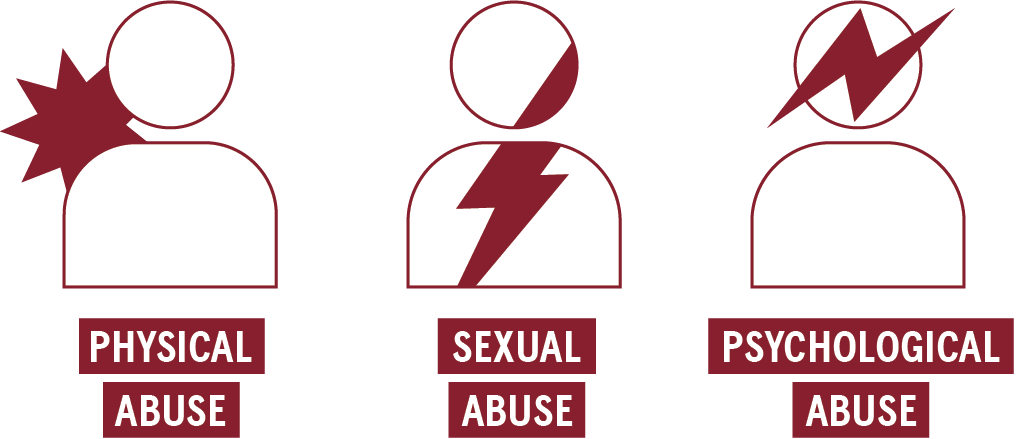
Who does domestic and family violence affect?
Domestic and family violence can happen to anyone. It occurs in all nationalities, races, religions, social backgrounds, sexualities and genders. It can be experienced by people with a lot of money or those living in poverty, by people who are in an intimate relationship and those who are not. However, women and children are overwhelmingly the victims of domestic and family violence and those who use violence are overwhelmingly male. People belonging to certain groups or communities may experience higher rates of domestic and family violence than others. Affected people may include:
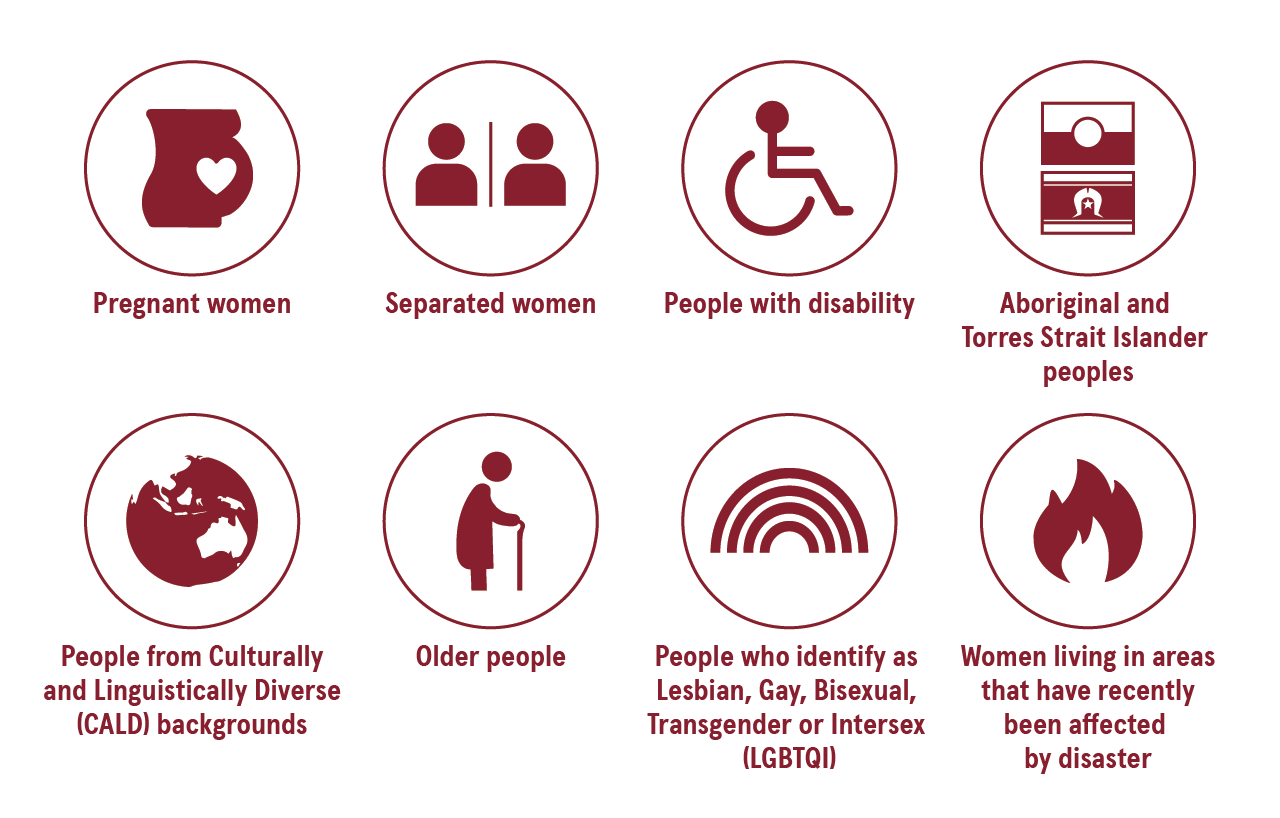
What relationships does domestic and family violence affect?
Domestic and family violence can also happen in any relationship, hetero or same-sex, including with:
- Husbands, wives, boyfriends and girlfriends
- Ex-husbands, ex-wives, ex-partners, ex-girlfriends and ex-boyfriends
- Parents, step-parents, guardians, brothers or sisters
- Careers or foster parents
What forms can domestic and family violence take?
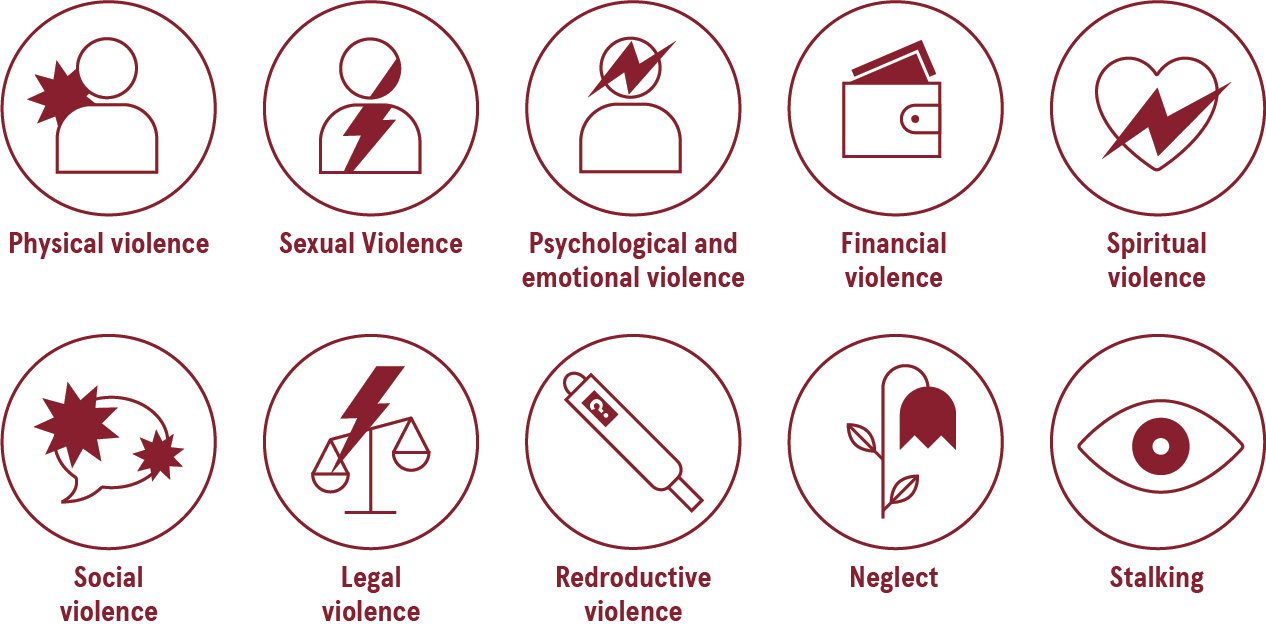
Impacts on children and young people
•ongoing anxiety and depression
•emotional distress
•eating and sleeping disturbances
•physical symptoms, such as headaches and stomach aches
•find it hard to manage stress
•low self-esteem
•self-harm
•be aggressive towards friends and school mates
•feel guilt or blame themselves for the violence
•have trouble forming positive relationships
•develop phobias and insomnia
•struggle with going to school and doing school work
•use bullying behaviour or become a target of bullying
•difficulty concentrating
•find it hard to solve problems
•have less empathy and caring for others
How can I tell if someone is experiencing domestic and family violence?
People experiencing domestic or family violence may:
- Suddenly stop going out with no reason
- Worry a lot about making a particular person angry
- Make a lot of excuses for someone's negative behavior
- Have marks or injuries on their body that can’t be explained
- Stop spending time with friends and family
- Seem scared or wary around a particular person
- Seem worried that they are being watched, followed or controlled in some way
A person whose behavior is violent or abusive may:
- Act in ways that make the other person scared
- Put the other person down all the time
- Make threats to hurt another person
They might control:
- Where someone goes
- Who they see and speak to
- What happens to their money
- How and when they can use their phone, car, or computer
- Have a lot of rules about how the other person is allowed to behave
- Get very angry when the other person doesn’t follow these rules
How can I support someone experiencing domestic and family violence?
It is OK to say something if someone you know is experiencing domestic or family violence. There are some simple things you can do to help, including believing them and taking their fears seriously. Remember that domestic and family violence is not just physical — it can also be emotional, financial, spiritual, social, legal, reproductive, and can include stalking and neglect.
Finding out that someone you know is being hurt is always hard. Perhaps you want to help but don't know what to do. The good news is that there are simple things you can do that can make a big difference.
When someone you know is experiencing domestic or family violence the way you talk and listen to them makes all the difference. You may be worried about doing the wrong thing, but it is important to know that it is OK to say something. Many people are glad to have the chance to talk about what they are going through.
When someone is experiencing violence they often feel trapped and out of control. These feelings can be made worse if you try to force them to do what you think is best. It is very important that people are supported to make their own choices, as they are ready.
What should I do to help someone experiencing domestic and family violence?
- Believe them and take their fears seriously. This is important no matter what you think of the person or people who hurt them
- Listen without interrupting or judging
- Never blame the person experiencing the violence for what has happened to them. Violence is never OK
- Don’t make excuses for the person who has hurt them
- Understand that they may not be ready or it may not be safe to leave. Don’t try to force them to do what you think is best
- Remember that domestic and family violence is not just physical
- Help in practical ways—with transport, appointments, child minding, or a place to escape to
What is the cycle of violence?
The cycle of violence explains how and why the behaviour of a person who commits domestic and family violence may change so dramatically over time. The cycle goes through a number of stages and provides an understanding as to why you or the person you are supporting might experience warning signs only sometimes during the day, week or month.
The cycle is not the same for everyone and some people may experience only some stages of the cycle or not relate to it at all. Please remember that the cycle is only a reference. If your experiences do not match this cycle, it does not mean that your experience of domestic or family violence is not to be considered just as seriously.
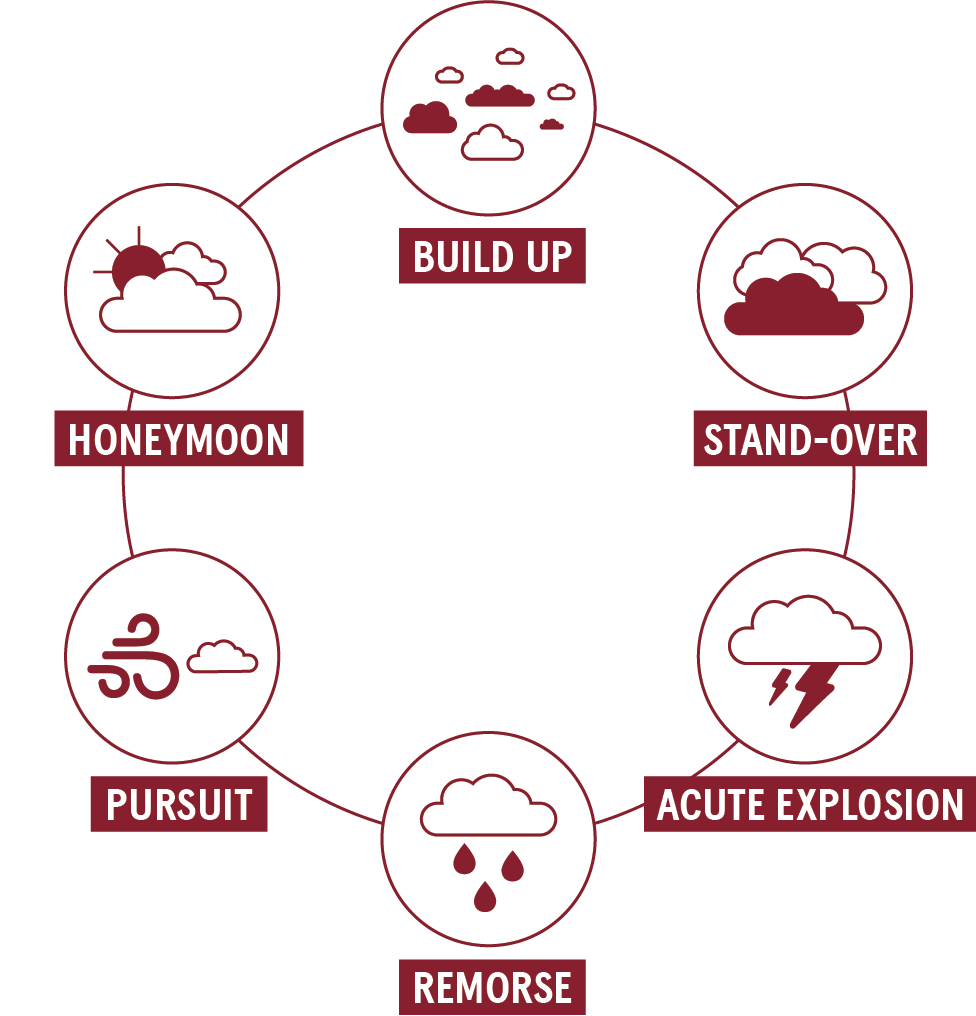
Have you thought about leaving the relationship or home?
If you have thought about leaving the relationship or home, here are some steps that will help keep you safe:
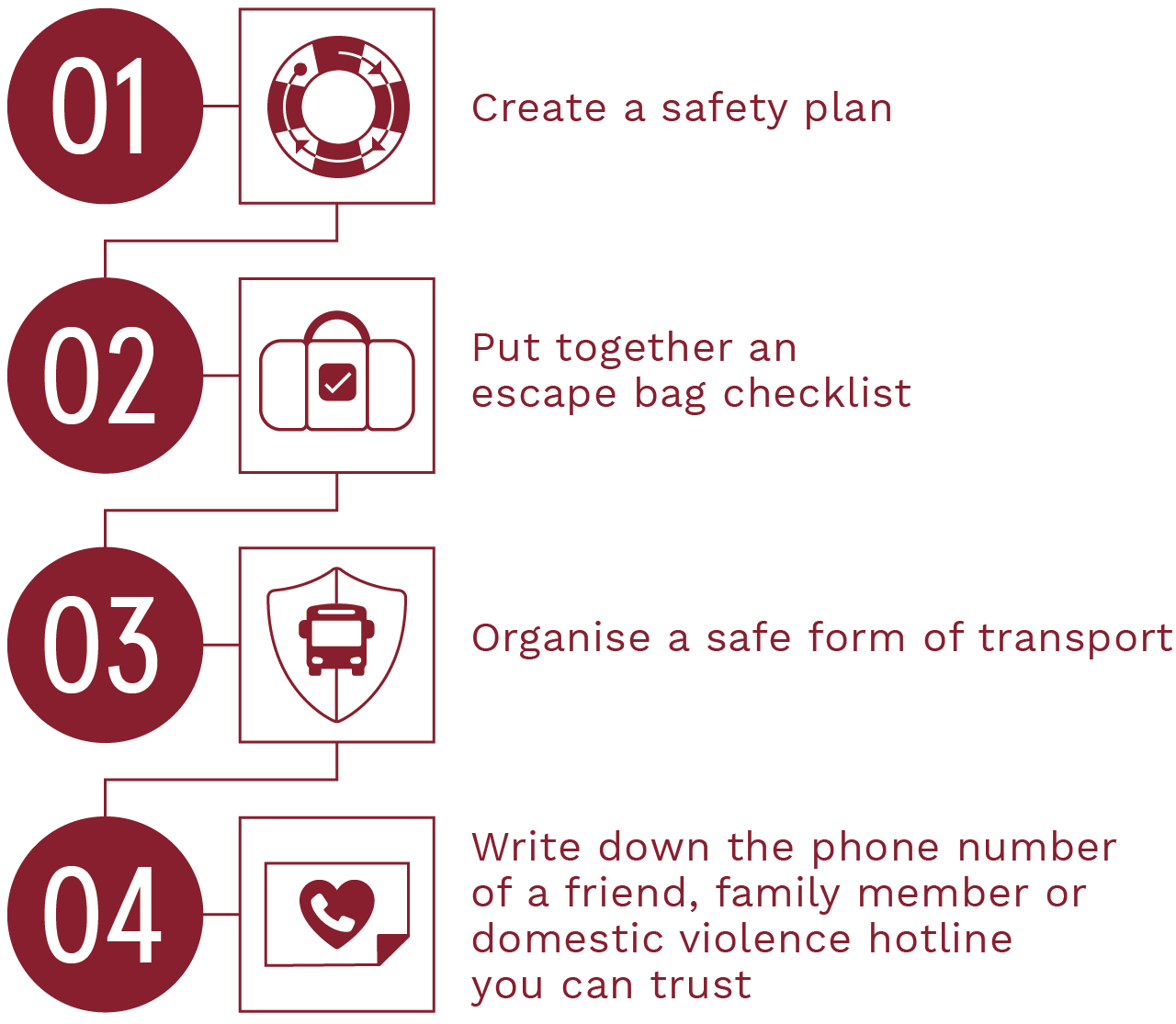
Create a Safety Plan
- Plan an escape route from every room in your home
- Think of safe area at home to go to if argument starts (away from weapons, hard surfaces and close to exits)
- Plan and practice the quickest way to leave the house
- Create and keep your escape bag close by but out of sight from perpetrator
- If possible, plan a safe time to exit the property
- Think about and make a list of safe people to contact, if possible memorise important numbers
- ALWAYS try to take your children with you or make arrangements to leave them with someone safe
- Create a CODE WORD or SIGN so your children/ neighbours or family know when to call the police for help
- If you have any mobility issues or disability arrange in advance for a friend or other support person to come straight away if you ring or text them
- Teach your children how to call the police: Dial 000 > Say address > Say name > Say “Help, mum is hurt”
Put together an Escape Bag Checklist
Essentials
- House and car keys
- ID: you and children
- Mobile phone and charger
- Change of clothes
- Medication
- Children’s favorite toy/blanket
- Baby equipment including bottles and nappies
Identification
- Your Passport and Birth Certificate
- Children’s passport and Birth Certificate
- Drivers License
Financial
- Money including cash, credit or debit card
- Bank details
Legal Papers
- ADVO (always have a copy on you in your purse)
- Tenancy agreement, lease, rental agreement or house deed
- Car registration and insurance papers
- Marriage Certificate and/or Divorce papers
- Custody Papers
Organise a Safe Form of Transport
- If you don’t have a car make sure arranged transport with a friend or public transport
- Remember you can call police to pick you up to take you to a safe place if you feel in immediate or potential danger
- Park close to your building for work and home and consider asking someone to accompany you to and from the car
- Only leave your home and work place when it is safe to do so
- If possible, park your car on the street instead of in the driveway so you cannot be blocked in
- Practice travelling to the location you have chosen as the safe place, such as a trusted family or friend or crisis accommodation
- After leaving the relationship, start changing your normal routine (catch different trains or buses, leave home or work at different hours, and shop in different places)
- If possible save some money in case you need to take emergency transportation to a safe place
Write Down the Phone Number
- Family Member
- Friend
- 1800 RESPECT - 1800 737 732
What are my options after leaving a violent situation?
After making the brave decision to leave your home due to DFV, you need to continue to ensure you and your children’s safety. You can do this by:
- Accessing crisis accommodation
- Accessing temporary accommodation
- Staying at a family or friends
When you arrive:
- Keep ALL addresses of your accommodation confidential; don’t tell anyone your location, not even mutual friends or family members of the perpetrator, in case the perpetrator locates you
- Inform the police you are safe and to let your trusted family know you are safe however the less your family know of your location the safer they will be if your partner asks them
- Talk to a DFV service, community lawyer or the police about getting an apprehended domestic violence order (ADVO) if you don’t already have one
- After leaving start changing your normal routine, such as, catching different trains or buses, leaving home or work at different hours and shopping in different places
- If you need to have contact with the perpetrator use email only, it is an easier way to keep a record of your conversations
- If you see the perpetrator get into a public space or busy place as soon as possible
- You are not under any legal obligation to inform your partner of your children’s whereabouts unless there are family law court orders in place – seek legal advice as soon as possible around disclosing your child’s current location
- Turn off the GPS location settings on your phone
- Get a Po Box for important mail, if the perpetrator has or could get access to your home letterbox
- Stay away from ALL social media as much as possible. Perpetrators can check your location via social media
- Change your mobile number to prepaid so it is untraceable
- Change all passwords: emails, banking, and social media for anything your partner may know the passwords to
- Get a new travel opal card that is untraceable and prepaid
- If speaking to support services, ensure you ask your address to be confidential
Can’t I just stay in my home?
- Tell trusted friends or relatives that you are no longer in the relationship and they should call the police if they see your former partner near or trying to gain access to your home
- Change the locks on your doors, make sure all windows are as secure as possible
- Have additional security installed- sensor lighting/ burglar alarm
- Change the routes you usually take your children to school
- Inform people who look after your children EG. Teachers, childcare, which people have permission to collect them. If you have an ADVO, give a copy to the school
- Change your phone number
- When at work ask someone to screen your calls, it may be a good idea to speak to a trusted supervisor/ senior to inform them of your current difficulties/ risks. It is up to you how much or how little you advise the supervisor at work of your current circumstances (if you chose to at all). We suggest this as it may mean your employer is more flexible with your start and finish time, which enhances aspects of your safety plan, which you can discuss with your case manager
- Change your routes within your standard weekly schedule EG. Shop in a different supermarket at different times and take a different route home
What are my legal rights?
WAGEC is unable to offer any specific legal advice however we can direct you to services that can help.
Women’s Legal Service NSW provides free confidential legal advice and referrals to women in NSW, with a focus on family law, parenting issues, domestic violence, sexual assault and discrimination. Its main objective is to inform women who have experienced violence about their legal rights and to help women obtain access to justice.
DOMESTIC VIOLENCE LEGAL ADVICE LINE:
(02) 8745 6999 or
1800 810 784
Mondays: 1:30pm–4:30pm
Tuesdays: 9:30am–12:30pm
Thursdays: 1:30pm–4:30pm
The ACCESS Program
Learn more about our mentoring programWhat is the ACCESS Program?
ACCESS is a free personalised mentoring program developed by Women's and Girls' Emergency Centre to support you to identify your strengths, build self-confidence and set goals for the future.
ACCESS is a 3–6-month program that supports women aged 18+ who would like free mentoring either in-person or virtually.
The program seeks to:
- identify strengths
- build self-confidence
- set goals for the future.
How long does the program last?
Most programs run for 3-6 months, but this depends on you and your goals.
How will my mentor be matched to suit me?
Based on the information you share in your application form, our friendly WAGEC team will find a mentor suited to you.
Who are the mentors?
ACCESS mentors are volunteers trained by WAGEC. They are women from all walks of life within our community who are passionate about supporting other women in achieving their goals.
Where and when do I meet my mentor?
You can meet with your mentor in-person or virtually, or a mix of both. It really depends on what works for you. Mentoring relationships might take place:
- on the phone - via video or audio calls
- via virtual meeting – using Zoom, Skype, or WhatsApp video calls
- at a café, library, community facility, or shopping centre
- by going for a walk together around the neighbourhood or the park
- by attending a course, workshop, or information session together
- via email or text message.
I’m caring for children during the day, how can this work for me?
You have options to work with your mentor to schedule calls around your child’s nap time or school hours.
Is mentoring for you?
ACCESS mentors help with the following:
- Increasing confidence
- Creating plans to support you in meeting your goals
- Helping you identify your strengths and areas that bring you joy
- CV updates, job applications, interview preparation
- Course applications
- Health and wellbeing plans
- Financial planning
How do I sign up?
What if I have a penalty notice, court fine or victim's restitution order to pay?
If you have a penalty notice, court fine or a victim's restitution order to pay, and you meet the eligibility criteria, we can support you to access a work and development order (WDO) and reduce the debt by up to $50 per session.
Get Involved
There are many ways you can support WAGEC.How do I make a donation to WAGEC?
Your generosity will help provide safe spaces for women and children in crisis, as well as deliver programs that promote women’s financial independence, nurture recovery from trauma and enable kids to thrive.
To make a on off donation, click here.
To make a monthly donation, click here.
How do I fundraise for WAGEC?
You can fundraise for WAGEC in lots of ways: others have held flash tattoo days, black-tie dinners and online dances. They have sold virtual coffees, t-shirts and tote bags. They have forgone wedding and birthday gifts. No matter what you choose, you will be helping to create safe spaces for women and families escaping homelessness or domestic violence.
If you're interested in raising funds for WAGEC, please get in touch with our team via fundraising@wagec.org.au.
How do I volunteer at WAGEC?
Support from volunteers means we can do more for women and families.
Volunteering is a great way to give back and to really make an impact in someone’s life. Whether this be through sorting donations that make their way to a relieved mum with the essentials like the new backpack her child needs for school, or a direct impact through providing tutoring services to children.
Due to a high number of individuals in our volunteer pool, we are currently not accepting applications to our volunteer program. Please keep an eye out on our social media and website for any future opportunities.
Active Bystanders and Allies
It takes a community to end gender based violence.What does it mean to be an active bystander and ally?
How do I support support someone?
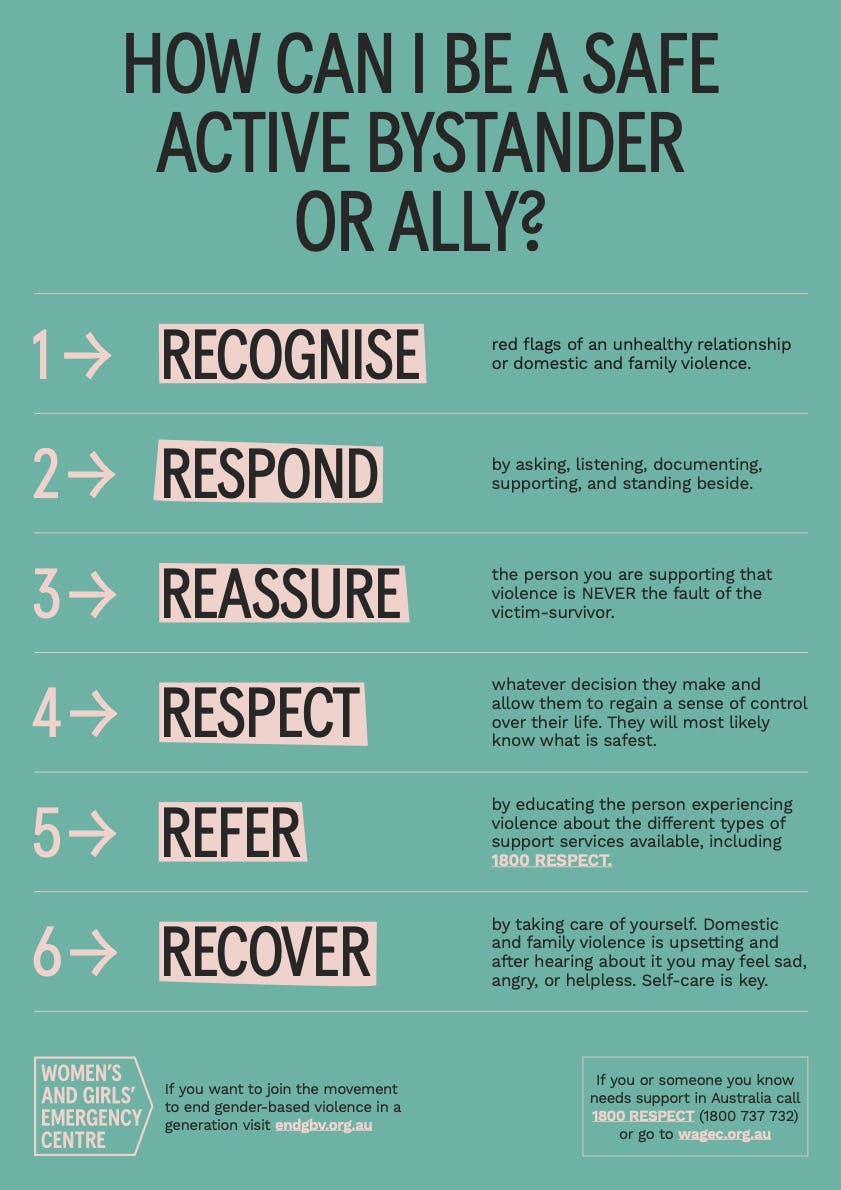
To download a free copy of this poster, click here.
Why doesn't she just leave?
There are many reasons why women don’t leave but it’s often because all their choices have been taken away, they are isolated from friends and family and they can’t see any other option. It may be that they are carefully managing the risk by staying in the relationship so that they know where their partner is and actively managing safety.
It may be shame, self-esteem, the impacts of complex trauma, access to financial resources or a safe affordable place to live. It might be pressure from people in her community, extended family, religion or fear of being completely disconnected from support networks. Not every victim-survivor wants to leave a relationship, most say that they just want the abuse to stop.
The violence and abuse experienced by victim-survivors is never their fault and it’s always a choice when perpetrators use violence. We know that when a woman leaves a violent relationship that it’s often the most dangerous time. We also know that it may take many attempts to leave, on average its 7.
For many, the abusive dynamic continues long after the relationship has ended, particularly when there’s an ongoing connection because of children.
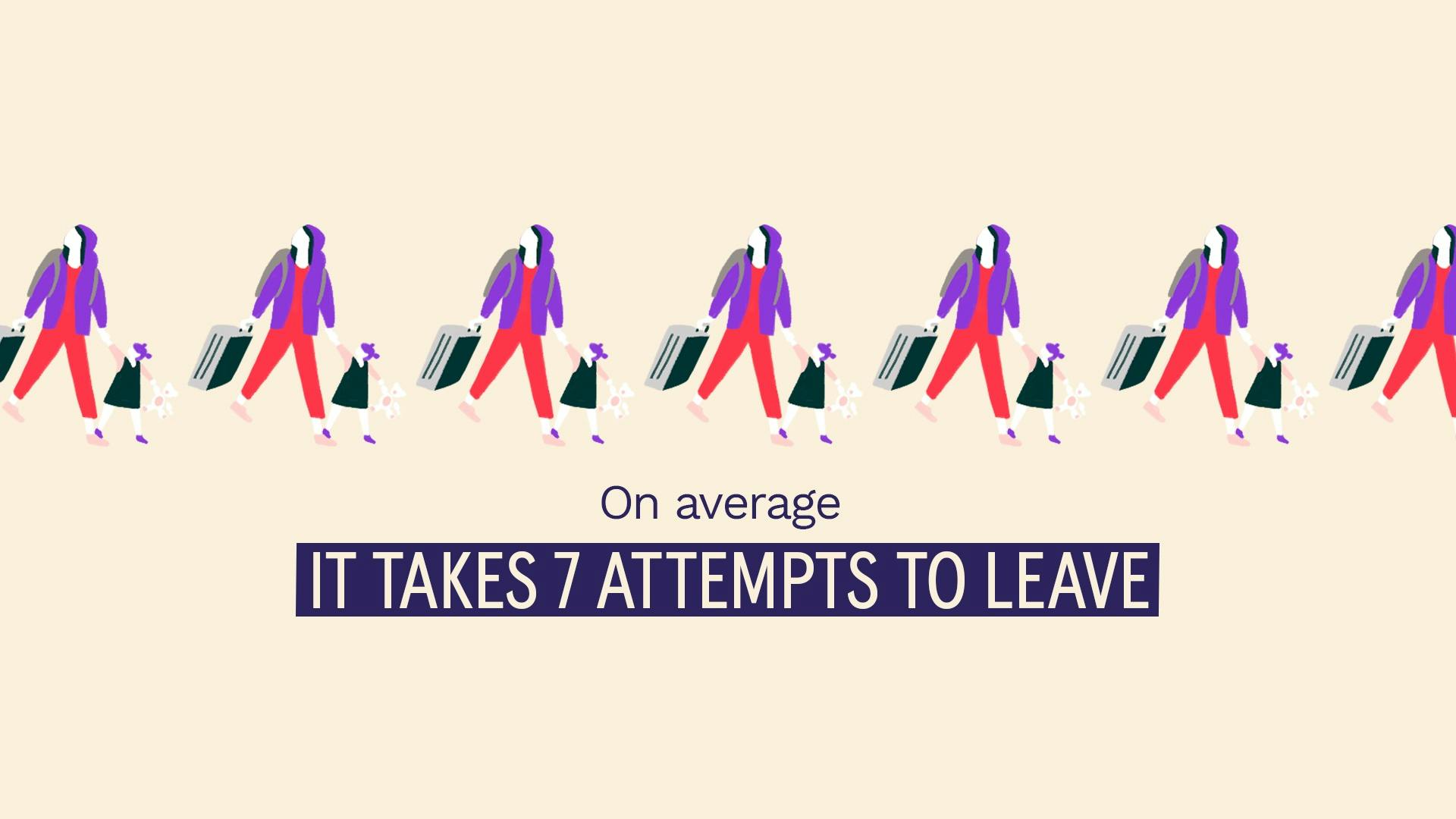
What are violent supportive attitudes?
- Denying gender inequality is a problem
- Condoning male peer relations involving aggression and disrespect towards women
- Undermining women's independence and decision making in private life
- Undermining women's independence and decision making in public life
- Promoting rigid gender roles, stereotypes and expressions
(Reference: Our Watch, Change The Story.)
Primary Prevention
Together we can end gender based violence in a generation.What is gender-based violence?
What are the impacts of gender-based violence?
How do we prevent gender-based violence?
How can parents, carers, and families help promote gender equality and healthy relationships?
1. Give children the freedom to develop their own interests, skills, and attributes. Don’t assume or imply what they should like, be good at, or behave like, based on gender.
2. Encourage children to do a range of different activities. Let them know it’s okay for girls to play outside and get messy, and for boys to do arts and crafts.
3. Allow children of all genders to feel and express the full range of emotions in a healthy way. Let them know it’s okay for boys to cry, and it’s okay for girls to be angry.
4. Provide books, toys, games, music, and posters which encourage girls to be strong, brave, leaders, smart, adventurous, solve problems and develop STEM skills.
5. Provide books, toys, games, music, and posters which encourage boys to be gentle, cooperative, kind, respectful, seek help, and to care for other people and animals.
6. Avoid saying things that reinforce gender stereotypes e.g. calling girls ‘bossy’ instead of assertive, and never use gender as an insult e.g. saying a boy ‘runs like a girl’.
7. Challenge any limitations that other parents, carers, family or community members place on your child based on gender stereotypes and roles.
8. Role model and encourage positive, equal, and respectful relationships with other people and animals, and never excuse or tolerate disrespect, aggression, or bullying.
9. Reward children’s caring and cooperative behaviours and encourage children to work and play with, and actively include children of all genders and backgrounds.
10. Create opportunities for all children to take turns being the leader, creating the rules for activities and games, and making decisions about different things.
What about men?
The simple answer is yes, men can and do experience abuse in relationships but its less likely to be physical and they are half as likely to report living in fear of injuries or their life. Men are much more likely to experience emotional abuse in an intimate partnership than any other type of violence.
The Australian Personal Safety Study tells us that 1 in 6 men report having experienced emotional abuse in a current or former relationship.
Men’s experiences of physical violence tend to be at the hands of other men and outside intimate partnerships. Regardless of who is experiencing violence, men are the overwhelming the majority of those perpetrating the violence.
Healthy Relationships and Red Flags
We all deserve to have healthy respectful relationships that make us feel safe, supported and happy.Healthy relationships and red flags
What is a healthy relationship?
There are a number of features or markers to what makes a relationship “healthy” or “unhealthy”. Many of these are similar for different kinds of relationships in our lives, but in this video we're going to focus particularly on intimate partnerships between two people and family relationships. A healthy relationship is one where everyone feels safe, cared for and respected.
In the intimate partnership context this means an equal partnership between two people that is marked by open communication, with both people having access to shared resources including money, equal decision-making and autonomy. Both people are free to have shared and individual interests, beliefs, and contact with family, friends and other social relationships. In a family setting this means that regardless of age, family structure, cultural expectations or hierarchy everyone is respected and feels safe.
In healthy and supportive relationships, we are connected to friends and family, have our own interests, and feel strong and supported in our culture or spiritual beliefs. Healthy relationships encourage us to be the best we can no matter what we do, how we look, and what we choose to do with our bodies. They give us confidence to voice our beliefs and opinions, and they help celebrate our achievements.
What are some signs of a healthy relationship?
A healthy relationship gives you freedom to:
- See family and friends
- Go out without the other person
- Control your own money
- Make decisions about your body
- Make decisions about your work, friends and where you live
- Have your own hobbies and interests
- Follow your own cultural practices, religion or spiritual beliefs
- Communicate when you feel unsafe
- Celebrate your achievements
- Voice your options and feelings
What is an unhealthy relationship?
Unhealthy relationships have an imbalance of power and an absence of unconditional respect. They may be marked by characteristics such as control, one partner feeling as though they “are walking on eggshells” around their partner, where there is an absence of trust, and consistent care and support.
Unhealthy relationships have signs that we sometimes refer to as red flags.
Red flags might be a partner checking our phone or social media, persuading us to do things that we are not comfortable to do, making it difficult for us to work or study or telling us what to wear. When a partner actively tries to stop us spending time with friends or family or they are jealous of the relationships that we have outside the partnership this is a red flag.
If they stop us from following our religious or cultural practices, tell us what to do or think or eat, these are all be signs of an unhealthy relationship.
What are some red flags of an unhealthy relationship?
It is never OK for someone in a relationship to:
- Physically hurt your body in any way
- Touch you in ways or places you don’t want to be touched
- Force you to have sex or do sexual things
- Expresses extremely jealously when you spend time or show affection to friends, family or your children
- Controls or monitors your technology (phone, computer or internet searches)
- Say and do things that make you feel scared or unsafe
- Take your money or use money to make your life hard
- Damage walls, parts of your home, or your things
- Threaten to hurt you, your children, your pets or people you care about
- Threaten to hurt themselves
- Share private photos or videos of you online without your permission
- Stop you from following your religion or cultural practices
- Isolate you from friends, family or the workplace
- Refuse to provide essential care and support for you if they are your parent, guardian, career, or paid support person
- Make looking after a baby hard by not letting you feed or settle your baby
- Scare you by following you, harassing you, or refusing to leave you alone
- Use the legal system to bully or intimidate you
- Stop you from making decisions about whether or not to have a baby, or other reproductive issues
- Stop you from having medicine you need or from seeing a doctor
- Give you medicine you don't need or more medicine than you need
When does an unhealthy relationship become abuse?
If someone who is supposed to care for us refuses to do so when we need it or controls our access to medication or support this is a strong indicator that we may be experiencing abuse.
If a partner threatens to hurt us, our children, pets or other animals or themselves it’s a sign that things are definitely not ok. Abusive behaviours often escalate, there may be patterns of control and violence followed by apologies and promises that things will change - we call this the cycle of violence.
Abuse doesn't have to be physical to do harm or be considered violence. Coercive control is a pattern of behaviour where a person is gradually isolated by their partner from their sources of external support and social interaction, preventing them from accessing the things they need to be independent, monitoring, criticising, and regulating their behaviour by stripping away their sense of self, choice, and freedom. It can be hard to spot from the outside and may happen slowly over a long period of time.
Abusive relationships make us feel isolated and unsafe.
WAGEC Shop
All you need to know about WAGEC merchIs WAGEC merch tax deductible?
WAGEC is a registered charity and all donations over $2.00 are tax deductible. This includes digital gift cards from our WAGEC shop.
However all other merchandise is not tax deductible.